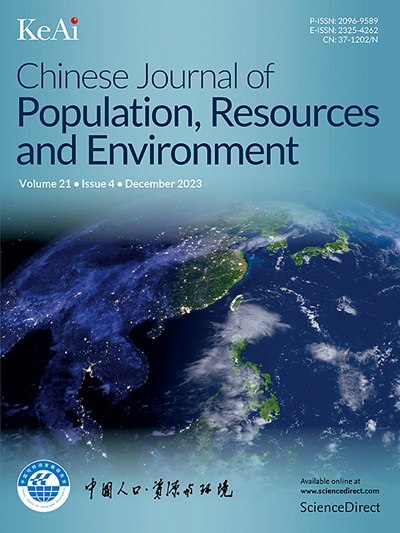Exploring a new model of urban sustainable development: The potential of oil tea as an ecological product in Guilin
IF 4.8
4区 环境科学与生态学
Q2 ENVIRONMENTAL STUDIES
Chinese Journal of Population Resources and Environment
Pub Date : 2025-03-01
DOI:10.1016/j.cjpre.2025.01.012
引用次数: 0
Abstract
Based on the concept of “Lucid waters and lush mountains are invaluable assets”, Chinese government is relying on the ecological and environmental characteristics of cities, in combination with modern ecological, economic, and sociological theories, to achieve sustainable urban development. However, the value realization of ecological products (EP) faces challenges in four major aspects: quantification, trading, transformation, and sustainability. At this stage, seeking breakthroughs to form a stable development path for the realization of the value of EPs is crucial. This paper examines the Guilin Sustainable Development Innovation Demonstration Zone and conducts a case study on oil tea, a characteristic EP. Based on the value realization of EPs, this paper analyzes the oil tea industry in terms of three functions: ecological protection, regional economic development, and traditional cultural support. Drawing on the theory of the gross ecosystem product, this paper examines the role of the value realization of oil tea in improving the quality of the urban living environment and ecosystem functions in Guilin. The results can help promote research on the shaping effects of endemic EPs on sustainable development with respect to the urban economy. Taking a human-centered perspective, the principles of landsenses ecology and traditional ecological knowledge can help analyze the social, historical, and cultural value of oil tea. Combined with on-site research data, a relationship map centered on oil tea culture is created to explore the importance of developing traditional cultural attributes of local EPs in promoting cultural customs, protecting the cultural diversity of ethnic minorities, and driving the development of the cultural tourism industry. By constructing a sustainable urban development model centered on developing local characteristic EPs with the core elements of ecology–economy–traditional culture, this paper aims to strengthen the ecological protection function of cities, promote high-quality economic development, and enhance the soft power of traditional culture. It provides scientific support for the sustainable development planning in Guilin.
探索城市可持续发展新模式:油茶生态产品在桂林的发展潜力
中国政府本着“绿水青山就是金山银山”的理念,依托城市的生态环境特点,结合现代生态学、经济学、社会学理论,实现城市的可持续发展。然而,生态产品的价值实现面临着量化、交易、转化和可持续性四个主要方面的挑战。在这一阶段,寻求突破,形成稳定的EPs价值实现发展路径至关重要。本文以桂林市可持续发展创新示范区为研究对象,以特色生态产品油茶为研究对象。基于EPs的价值实现,本文从生态保护、区域经济发展、传统文化支撑三个方面对油茶产业进行了分析。本文运用生态系统生产总值理论,考察油茶价值实现对桂林市城市生活环境质量和生态系统功能的改善作用。研究结果有助于推动地方性EPs对城市经济可持续发展的塑造效应研究。从以人为本的角度出发,运用景观生态学原理和传统生态学知识,分析油茶的社会、历史和文化价值。结合现场调研数据,绘制以油茶文化为中心的关系图,探讨发展当地ep传统文化属性在弘扬文化习俗、保护少数民族文化多样性、带动文化旅游产业发展中的重要性。以生态-经济-传统文化为核心要素,构建以发展地方特色EPs为核心的可持续城市发展模式,强化城市生态保护功能,促进经济高质量发展,提升传统文化软实力。为桂林市可持续发展规划提供科学依据。
本文章由计算机程序翻译,如有差异,请以英文原文为准。
求助全文
约1分钟内获得全文
求助全文
来源期刊

Chinese Journal of Population Resources and Environment
ENVIRONMENTAL STUDIES-
CiteScore
4.30
自引率
1.10%
发文量
791
审稿时长
79 days
期刊介绍:
The Chinese Journal of Population, Resources and Environment (CJPRE) is a peer-reviewed international academic journal that publishes original research in the fields of economic, population, resource, and environment studies as they relate to sustainable development. The journal aims to address and evaluate theoretical frameworks, capability building initiatives, strategic goals, ethical values, empirical research, methodologies, and techniques in the field. CJPRE began publication in 1992 and is sponsored by the Chinese Society for Sustainable Development (CSSD), the Research Center for Sustainable Development of Shandong Province, the Administrative Center for China's Agenda 21 (ACCA21), and Shandong Normal University. The Chinese title of the journal was inscribed by the former Chinese leader, Mr. Deng Xiaoping. Initially focused on China's advances in sustainable development, CJPRE now also highlights global developments from both developed and developing countries.
 求助内容:
求助内容: 应助结果提醒方式:
应助结果提醒方式:


